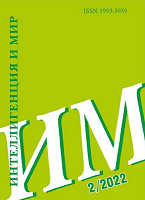Материальное положение советской интеллигенции (конец 1920-х — начало 1950-х гг.)
The financial situation of the Soviet intelligentsia (late 1920s — early 1950s)
Author(s): Oleg Vasilyevich ZolotarevSubject(s): Economic policy, Government/Political systems, Social Theory, Interwar Period (1920 - 1939), History of Communism
Published by: Ивановский государственный университет
Keywords: Intelligentsia; government; industrialization; state policy towards the intelligentsia; personnel; economy; privileges; wages; standard of living;
Summary/Abstract: The article examines the processes associated with the dynamics of the financial situation of the Soviet intelligentsia during the years of Stalin’s modernization. The issues of state policy aimed to improve the standard of living of the intelligentsia, its forms and methods are considered. During this period, the power structures make a clearly indicated choice of introducing the measures of financial support of the intellectual strata. This turn was due to the fact that the regime in the 1930s had an acute need for intellectual labor. This circumstance determined an obvious trend in matters of financial support for the intelligentsia: the work of specialists necessary for the modernization of the country, despite the negative reaction of the public, begins to be highly paid. Unlike the NEP times, this policy concerns not only technical specialists, but also broad layers of the humanitarian intelligentsia. Gradually, the incomes of scientists, teachers, cultural workers, etc. not only equaled, but also exceeded the wages of workers. We should not forget about the number of privileges granted to representatives of intellectual professions (especially in the housing sector). At the beginning of the 1950s, there was a peak in the well-being of representatives of intellectual professions, when the standard of living of the Soviet intelligentsia most significantly exceeded the financial situation of workers and, especially, peasants. It was by the end of the Stalinist period that Soviet intellectuals in many ways approached their pre-revolutionary status. Thus, scientific and creative representatives of the Soviet intelligentsia made up one of the most privileged and well-off socio-professional groups of Soviet society. The privileged position of Soviet intellectuals is largely explained by the special place that the intelligentsia occupied in the system of Stalinist socialism. In turn, the government also benefited from the line that allowed the carriers of intellectual labor to achieve relative economic well-being. Largely thanks to their work, the regime managed to ensure the country’s breakthrough in economic and technological terms. The modernization of the country, therefore, inevitably led to an improvement in the financial situation of the intellectual strata of society and to a rapprochement between the authorities and the intelligentsia.
Journal: Интеллигенция и мир
- Issue Year: 2022
- Issue No: 2
- Page Range: 9-26
- Page Count: 18
- Language: Russian

